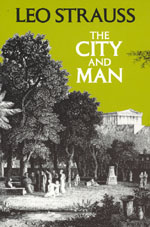The City and Man, Rand McNally, 1964. Reprint: University of Chicago Press, 1978.
Excerpt:
It is not self-forgetting and pain-loving antiquarianism nor self-forgetting and intoxicating romanticism which induces us to turn with passionate interest, with unqualified willingness to learn, toward the political thought of classical antiquity. We are impelled to do so by the crisis of our time, the crisis of the West. It is not sufficient for everyone to obey and to listen to the Divine message of the City of Righteousness, the Faithful City. In order to propagate that message among the heathen, nay, in order to understand it as clearly and as fully as is humanly possible, one must also consider to what extent man could discern the outlines of that City if left to himself, to the proper exercise of his own powers. But in our age it is much less urgent to show that political philosophy is the indispensable handmaid of theology than to show that political philosophy is the rightful queen of the social sciences, the sciences of man and of human affairs: even the highest lawcourt in the land is more likely to defer to the contentions of social science than to the Ten Commandments as the words of the living God.
The theme of political philosophy is the City and Man. The City and Man is explicitly the theme of classical political philosophy. Modern political philosophy, while building on classical political philosophy, transforms it and thus no longer deals with that theme in its original terms. But one cannot understand the transformation, however legitimate, if one has not understood the original form.
Modern political philosophy presupposes Nature as understood by modern natural science and History as understood by the modern historical awareness. Eventually these presuppositions prove to be incompatible with modern political philosophy. Thus one seems to be confronted with the choice between abandoning political philosophy altogether and returning to classical political philosophy. Yet such a return seems to be impossible. For what has brought about the collapse of modern political philosophy seems to have buried classical political philosophy which did not even dream of the difficulties caused by what we believe to know of nature and history. Certain it is that a simple -continuation of the tradition of classical political philosophy—of a tradition which was .hitherto never entirely interrupted—is no longer possible. As regards modern political philosophy, it has been replaced by ideology: what originally was a political philosophy has turned into an ideology. This fact may be said to form the core of the contemporary crisis of the West.
Online:
Google Books
Amazon

